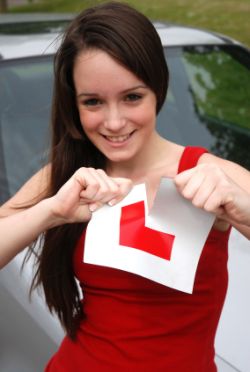Dealing with nerves
Learning to drive can make people nervous, and even if you are a confident
driver then you may get nervous before the driving test itself. If this
happens to you, then don't worry. It is only natural to get nervous before
an important event such as a driving test, so don't let it make you even
more anxious than you already are.
By knowing that virtually everyone who takes the test gets nervous that in
itself could provide some form of comfort to you. And remember that the
driving test assessors expect candidates to be nervous.
Also remember that when the test proper starts and you are busy
concentrating on driving, you will soon get into the swing of the test and
whilst you may still be nervous, you should try to focus that nervous energy
into driving as well as you can and remembering everything your instructor
told you - whilst listening carefully to and following the instructions of
the driving test assessor sitting alongside you.
The main reason that people get nervous before a driving test is fear of
failure. Many have a what if scenario that runs through their mind: what if
I crash the car? What if the assessor thinks I'm useless? What if I simply
fail the test, will my mates laugh at me as they passed first time? Where
will I get the money from for another test?
There are all sorts of questions that can arise. So you should just try to
be calm and take some long, deep breaths before the driving test.
Controlling your breathing can help to calm you down - there are many
websites out there that can give you detailed breathing methods to calm you
down and make you feel more in control.
Related Articles...
What are greener fuels
One of the most well known of the green fuels is something that is called Biofuel.
Biofuel is a group of different fuels rather than an individual fuel in itself, and the class contains things...
Pass Plus Explained
There is an old saying of driving instructors which they state once you've passed your test, and that is that now you really learn to drive. The idea is that you are about to start driving...
What to do at level crossings
When you are learning to drive you may well not come across a level crossing, depending where you live. But as a driver you certainly will come across level crossings and will need to know how to...
Overtaking cyclists safely
You need to constantly be on the lookout for cyclists because they are a lot less visible than cars and motor vehicles.
Whilst cyclists should have lights in poor light conditions or in the...
Road conditions: driving in rain
Driving in rain is something that you can be sure you will experience regularly once you are an actual driver, although depending where you live and the time of year you learnt, you might have...
Driving Theory
Practice makes perfect. It is a known fact that if you practice a particular skill, you get better at it. This is true of mental skills such as performing mental arithmetic: the more you try to do...
Using emergency telephones
There are emergency telephones along motorways. There are telephones that occur roughly once per mile along the motorway which are connected to the emergency services.
There are also blue and...
What causes accidents: junctions
An alarmingly high proportion of accidents happen in and around junctions.
This is because of the combination of busy roads, traffic that can be nose to tail and people crossing all sorts of...
What is driving test theory?
Theory is something we understand when it comes to maths or science. A theory is a prediction as to why something that has usually been observed to happen does happen, and scientists use theories...
What to do at a box junction
The box junction is quite common but despite this there are a whole wide range of ways in which different drivers interpret what they are supposed to do at them so you will see different behaviours...
Back to home page of driving theory test questions

